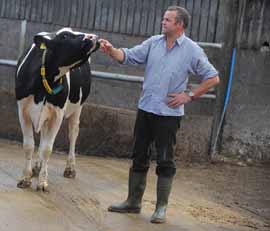‘Super dairy’ farmer flouts pollution rules

One of the farmers behind plans for Britain’s first ‘super dairy’ has been ordered to pay £23,190 after flouting environmental regulations.
Peter Willes, of Higher Alminstone Farm in Woolsery, Bideford, Devon, pleaded guilty to three environmental offences.
The case was brought by the Environment Agency following a fire on a Hartland farm in which wastes including plastics, a fridge, tyres and light bulbs were burnt.
Mr Willes admitted allowing controlled waste to be deposited without a permit at Beckland Farm on 2 February 2010.
He also admitted causing slurry and milk to enter a stream on or before the same day, and a further charge of allowing effluent in another stream.
Beckland Farm is one of the largest farms in North Devon with a dairy herd of over 2,000 cattle and a cheese factory.
More than £1 million has been spent at Beckland Farm over the last couple of years to expand the herd.
Mr Willes is also a director of Nocton Dairies, the company behind controversial plans to establish an 8,100-cow ‘super dairy’ in Lincolnshire.
The proposals were downscaled to 3,770 cows before being withdrawn in the face of Environment Agency concerns earlier this year.
Mr Willes was prosecuted after off-duty Environment Agency officer Sean McKay noted that the stream bed in Beckland woods was thickly coated with algae.
He also spotted a farm waste tip on the nearby farm managed by Peter Willes.
Two days later, Mr McKay was called to a fire at the farm, when he saw that waste on the tip site had been lit.
A variety of hazardous wastes such as veterinary wastes, metal halide bulbs, strip lights, an upright fridge, tyres, plastics and fibreglass had been burnt.
The Environment Agency returned on 11 February 2010 to discover silage was leaking from the farm to another stream.
Colonies of blood worms were present, a sign of prolonged pollution.
“No drainage survey was carried out when the dairy was expanded to identify risks and to divert water polluted with cattle faeces to the slurry tank,” said Mr McKay.
“In addition, an enormous silage store had been built without complying with the guidelines.
“This had resulted in prolonged discharges of silage effluent and slurry to two separate streams, both of which were extensively affected.”
“Although this incident had the potential to cause harm to the environment, fortunately, on this occasion, no long term harm occurred.”
Mr Willes was fined £19,500 and ordered to pay £4,190 costs by North Devon Magistrates after pleading to causing polluting matter to enter controlled waters.
He also admitted an offence under the Water Resources Act 1991, and depositing controlled waste on land.
Speaking afterwards, Mr Willes said: “The incidents arose from mistakes made on our farm at a time when the farm was very short of labour, in particular at management level, and responsibility has been taken for these.”
Immediate action was taken to investigate and resolve the issues as soon as they came to light, Mr Willes added.
Tests had since shown that surface waters arising on the farmland were of good to high standard. An environmental manager had also been appointed to monitor performance and ensure best practice was applied wherever possible.
The Environment Agency acted on over 9,000 water pollution incidents last year and 1,000 waste issues.
Mr Willes said: “This does not make mistakes acceptable, but decisive action has been taken to ensure that future training and management will reflect the seriousness with which the Willes family takes its environmental responsibilities.”
